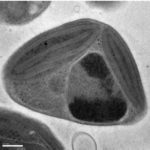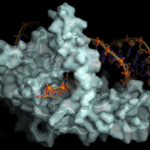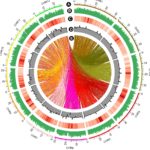Miniaturized, microfluidic-based metagenomics technology developed under the aegis of U.S. Department of Energy Joint Genome Institute’s (DOE JGI’s) Emerging Technology Opportunity Program (ETOP) has enabled researchers to shine a light on so-called microbial “dark matter”—the majority of the planet’s microbial diversity that remains uncultivated. Researchers from Stanford University demonstrated the efficacy of the new technique, extracting 29 novel microbial genomes from Yellowstone hot spring samples while still preserving single-cell resolution to enable accurate analysis of genome function and abundance. Read more in this JGI Science Highlight.
Tiny Green Algae Reveal Large Genomic Variation
A decade after the complete representative genomes of three Ostreococcus groups were sequenced, an international team of researchers including scientists at the Department of Energy Joint Genome Institute (DOE JGI) have resequenced and analyzed the genomes of 13 members of a natural population from the northwest Mediterranean Sea. The analysis revealed that the O. tauri population is larger than anticipated, with high genetic and phenotypic diversity that is influenced by the algae’s natural resistance to ocean viruses. Understanding the genetic variability of various Ostreococcus strains will help researchers understand how environmental changes affect their abundance and ability to photosynthesize. The work was reported in Science Advances. Read more in this DOE JGI Science Highlight.
Researchers ID New Mechanism for Keeping DNA Protein in Line
Using a combination of crystallographic, biochemical, and genetic analyses, Berkeley Lab researchers have shown that the actions of FEN1, an enzyme involved in DNA replication and repair, are guided by electrostatic forces known as phosphate steering. Susan Tsutakawa and John Tainer in the Biosciences Area’s Molecular Biophysics and Integrated Bioimaging (MBIB) Division were the lead and corresponding authors, respectively, on the report published this week in Nature Communications. The work reveals key details of this previously unknown mechanism controlling the specificity of FEN1 in healthy cells and provides new directions for cancer treatment research. Read more from the Berkeley Lab News Center.
Brain-Inspired Chips for Big Data Science
With funding from the Department of Energy’s (DOE’s) Laboratory Directed Research and Development (LDRD) program, Berkeley Lab researchers from the Computational Research Division (CRD) and the Biosciences Area are collaborating to explore how brain-inspired computer chips might benefit science.
A Whole-Genome Sequenced Rice Mutant Resource for the Study of Biofuel Feedstocks
Researchers at the DOE Joint BioEnergy Institute (JBEI), part of the Biological Systems and Engineering (BSE) Division, in collaboration with the Joint Genome Institute (JGI) are reporting the first whole-genome sequenced of a mutant population of Kitaake, a model variety of rice. Their high-density, high-resolution catalog of mutations facilitates the discovery of novel genes and functional elements that control diverse biological pathways. Read the press release at the Berkeley Lab News Center.
- « Previous Page
- 1
- …
- 148
- 149
- 150
- 151
- 152
- …
- 213
- Next Page »
Was this page useful?








